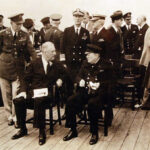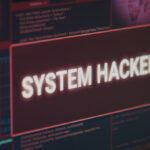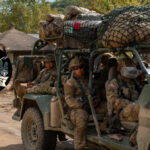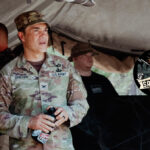
A little over two years ago we sat down with the students and advisors of Integrated Research Project (IRP) #6. Their task was to examine leadership development requirements in the multi-domain operations environment in the year 2040. Due to a hardware malfunction we thought we had lost the recordings of these conversations, but just recently we were able to recover the files. Though the conversation has a couple of dated references, we thought the topic was still worth airing. A BETTER PEACE is happy to welcome Chance Geray, Tim Monroe and Jason Schmidt to the studio for the last of three episodes to discuss what the team found looking forward twenty years. In this final episode they tie together all of the research findings from the IRP. They look at current leadership development trends, the challenges of the future battle environment and what has to be done to ensure that the U.S. continues to have the most capable leaders for tomorrow. They’ll lay the foundation for the changes necessary to ensure U.S. military leadership is prepared for future warfare and peacekeeping.
Where it becomes more complicated is when you consider the tools and the battle space that we will have to be operating in and the challenges that those pose to people at various echelons through the chain of command.
Podcast: Download
Chance Geray is a graduate of the AY 19 resident class at the U.S. Army War College and a Colonel in the U.S. Air Force. He earned his commission through Air Force ROTC at North Dakota State University in 1997. He has served in staff, and operational command positions both in-garrison and deployed throughout the communications and cyberspace career field. He is currently the Commander of the 81st Training Group at Keesler Air Force Base, Mississippi.
Tim Monroe is a graduate of the AY 19 resident class at the U.S. Army War College and a Colonel in the U.S. Air Force. He received his commission as a Distinguished Graduate from the Air Force ROTC program at Embry-Riddle Aeronautical University in Daytona Beach, Florida. A graduate of the Euro-NATO Joint Jet Pilot Training Program, his assignments include flying operations in the F-15C, and MQ-9A in support of Operations NOBLE EAGLE and ENDURING FREEDOM. He served as Air Combat Command’s Persistent Attack and Reconnaissance Division Chief prior to his current assignment as the Commander, 25th Attack Group, Shaw Air Force Base, South Carolina.
Jason Schmidt is a Colonel in the U.S. Air Force and a distinguished graduate of the AY 19 resident class at the U.S. Army War College. He is also a graduate of the U.S. Air Force Academy. He has served in staff, and command positions throughout the DoD including Headquarters Air Force, the Joint Staff, the Office of the Chairman of the Joint Chiefs of Staff and United States Strategic Command, where he is currently the Director, Human Capital Directorate (J1).
Buck Haberichter is the Managing Editor of the War Room.
The views expressed in this presentation are those of the speakers and do not necessarily reflect those of the U.S. Army War College, U.S. Army, U.S. Air Force or Department of Defense.
Photo Credit: Background photo created by wirestock – www.freepik.com





I hear that it is expected that recruits (enlisted and officer) need to be self-improving have the ability to learn – but this assumes that the individual is actually “educated” in the basics or reading, writing, and arithmetic (logic) – all of which will help people in ‘how to learn’. Perhaps, for the sake of America’s future (civilian & military), the US military needs to support and encourage that these basics actually be taught in the country’s early educational system (which we seem to be getting away from now).
Two items, especially, caught my ear in this third in a series of three podcasts re: leadership development 2040; these such two items being (a) battlespace and (b) change.
In this regard, let us consider that (a) the “battlespace” — yesterday, today and going forward to 2040 (and beyond?) — this, in fact, will be (b) the “battlefield” of “change.” From this exact such perspective — yesterday, and indeed today and going forward to 2040 — one finds oneself:
a. On one side of the conflict, for example, that which is promoting what they believe to be positive, favorable and necessary “change” — such as, re: communism, the Soviets/the communists in the Old Cold War of yesterday and, such as, re: market-democracy, the U.S./the West in the New/Reverse Cold War of today. Or, one finds oneself:
a. On the other side of the conflict, for example, that which is resisting, seeking to prevent and/or seeking to reverse what they believe to be negative, unfavorable and/or unnecessary “change” — such as, re: communism, the U.S./the West in the Old Cold War of yesterday and, such as, re: market-democracy, such diverse entities as Russia, China, Iran, N. Korea and the Islamists in the New/Reverse Cold War of today.
(Note that, in such “change” scenarios as I have identified above — one’s both at home and abroad “natural enemies” — and one’s both at home and abroad “natural allies” – these will be determined based on which side of the conflict [the pro-change side or the anti-change side] one is on.)
Another way of looking at this such “battlespace”/this such “battlefield, this is from the perspective of (a) the “revolutionaries” and (b) the “resistance.” In this regard, consider the following contemporary scenario:
Post-the Old Cold War, the U.S./the West’s embarked upon a “revolutionary”/”global change” initiative (undertaken both here at home and there abroad). This such “revolutionary”/”global change” initiative being undertaken so as to cause the states and societies of the world (to include our own) to become better able to interact with, better able to provide for and better able to benefit from such things as capitalism, globalization and the global economy.
Problem: As with all such “revolutionary”/”global change” initiatives, this creates a worldwide “Army” — a worldwide “arsenal” — of governments, population groups, etc. (to include such elements in one’s own country) whose primary efforts — today and going forward — will be directed toward “resisting,” “preventing” and/or “reversing” such unwanted “change.” Why? Because such “change” — whether beneficial or essential to national security or not — obviously (a) threatens the status quo and, thus, (b) threatens the status, privilege, prosperity, safety, security, etc. — of everyone, everywhere — who relies on the status quo for such benefits.
Bottom Line Thought — Based on the Above:
If we are going to find and/or produce agile and capable leadership — today and going forward to 2040 — this such leadership must understand, and be able to work both smoothly and capably within, the “change” battlespace I identify above.
(In this regard, such things as “the main battlespace is in the mind” [see “Russia’s New Generation Warfare in Ukraine” by Janis Berzins, National Defense Academy of Latvia, April 2014, Page 5.] and “the human domain is the critical area of competition” … “society is the current and future battlefield” [see the Small Wars Journal article “The Battlefield of Tomorrow Fought Today: Winning in the Human Domain, by MG James B. Linder, et. al] come to mind.)
Want to test my “bottom line” statement/thought above? Then consider whether such diverse things as “influence,” “unconventional warfare,” “counterterrorism,” “counterinsurgency, “irregular warfare,” “foreign internal defense,” etc. — whether any of these such matters can be properly discussed; this, without referring to the “change” battlespace/battlefield I identify above.
Given the “change” battlespace/battlefield I identify above — one which finds the U.S./the West being in the position of being the “revolutionary”/the “pro-change” entity today — given these such matters, the following guidance from Dr. Robert Egnell may prove exceptionally useful, this, to U.S./Western military leaders, today and going forward to 2040?
“Robert Egnell: Analysts like to talk about ‘indirect approaches’ or ‘limited interventions’, but the question is ‘approaches to what?’ What are we trying to achieve? What is our understanding of the end-state? In a recent article published in Joint Forces Quarterly, I sought to challenge the contemporary understanding of counterinsurgency by arguing that the term itself may lead us to faulty assumptions about nature of the problem, what it is we are trying to do, and how best to achieve it. When we label something a counterinsurgency campaign, it introduces certain assumptions from the past and from the contemporary era about the nature of the conflict. One problem is that counterinsurgency is by its nature conservative, or status-quo oriented – it is about preserving existing political systems, law and order. And that is not what we have been doing in Iraq and Afghanistan. Instead, we have been the revolutionary actors, the ones instigating revolutionary societal changes. Can we still call it counterinsurgency, when we are pushing for so much change?
Dhofar, El Savador and the Philippines are all campaigns driven by fundamentally conservative concerns. When we are looking to Syria right now, it is not just about maintaining order or even the regime, but about larger political change. In Afghanistan and Iraq too, we represented revolutionary change. So, perhaps we should read Mao and Che Guevara instead of Thompson in order to find the appropriate lessons of how to achieve large-scale societal change through limited means? That is what we are after, in the end. And in this coming era, where we are pivoting away from large-scale interventions and state-building projects, but not from our fairly grand political ambitions, it may be worth exploring how insurgents do more with little; how they approach irregular warfare, and reach their objectives indirectly.”
(See the Small Wars Journal article “Learning from Today’s Crisis of Counterinsurgency” — an interview of Dr. David H. Ucko and Dr. Robert Egnell by Octavian Manea.)
Given the information that I have provided in this LEADERSHIP 2040: A PATHWAY TO THE FUTURE series, the following seems clear:
1. The U.S./the West and our allies, in the New/Reverse Cold War of today, these folks now hold the exact same position that the Soviets/the communist and their allies held in the Old Cold War of yesterday. — this such position being — that of the “revolutionary”/the entities seeking to achieve, both at home and abroad, “change.” (In our case, so as to allow that the states and societies of the world, to include our own, might come to better interact with, better provide for and better benefit from such things as capitalism, globalization and the global economy.) This while:
2. Our competitors and their allies, in the New/Reverse Cold War of today, these folks now hold the exact same position that the U.S./the West and our allies held in the Old Cold War of yesterday — this such position being — that of the “resistance”/the entities seeking to prevent and/or to reverse unwanted “change.” Accordingly:
3. The leadership of the U.S./the West, in the New/Reverse Cold War of today, these folks must be “developed” and supported in such a way as to:
a. Allow them to achieve the U.S./the West’s “revolutionary” political objectives. (Requires, thus, training, etc., along “revolutionary warfare” lines?); this,
b. In the face of our competitors pursing “resistance” political objectives — and training and developing their leaders — accordingly, along “resistance warfare” lines.
(Note how the above explanation allows us to understand why and how [a] the U.S./the West would seek to work more “by, with and through” the more conservative elements of the world’s populations in the Old Cold War of yesterday and why and how [b] our competitors would seek to work more “by, with and through” the more conservative elements of the world’s populations in the New/Reverse Cold War of today.)
Addendum:
With regard to (a) we, ourselves, in the U.S./the West, being engaged in “revolutionary” activities and using such things as “liberal” values in the pursuit of same. And with regard to (b) our opponents/our competitors — in response to our such “change” initiatives — being engaged in “resistance” activities and using such things as “conservatism” and “traditional” values in the pursuit of same. With regard to these such matters, consider the following additional items:
The U.S./the West: “Since the end of World War II, the United States has pursued a strategy aimed at overturning the status quo by spreading liberalism, free markets, and U.S. influence around the globe. … the United States’ posture stokes fear in Beijing and beyond. … But at its heart, U.S. grand strategy seeks to spread liberalism and U.S. influence. The goal, in other words, is not preservation but transformation. … The United States has pursued this transformational grand strategy all over the world. … In each of these regions (Europe, the Middle East, East Asia), U.S. diplomatic, economic, and military policies are aimed not at preserving but at transforming the status quo. (Item in parenthesis is mine.) (See Dr. Jennifer Lind’s Foreign Affairs [Mar/Apr 2017 edition] article “Asia’s Other Revisionist Power: Why U.S. Grand Strategy Unnerves China.”)
Russia: “In his annual appeal to the Federal Assembly in December 2013, Putin formulated this ‘independent path’ ideology by contrasting Russia’s ‘traditional values’ with the liberal values of the West. He said: ‘We know that there are more and more people in the world who support our position on defending traditional values that have made up the spiritual and moral foundation of civilization in every nation for thousands of years: the values of traditional families, real human life, including religious life, not just material existence but also spirituality, the values of humanism and global diversity.’ He proclaimed that Russia would defend and advance these traditional values in order to ‘prevent movement backward and downward, into chaotic darkness and a return to a primitive state.’ ” (See the Wilson Center publication “Kennan Cable No. 53” and, therein, the article “Russia’s Traditional Values and Domestic Violence,” by Olimpiada Usanova, dated 1 June 2020.)
China: “The neoliberal trend of thought has severely affected China’s dominant ideology and has had a serious impact on China’s Reform and Opening policy and economic foundation. [Neoliberalism] not only endangers China’s ideological security but also endangers the state’s economic security. The values of the supremacy of the individual and freedom have a negative impact on dominant Chinese values such as collectivism, equity, and justice. The theory of privatization challenges the current Chinese concept of socialist ownership and impacts the economic foundation of public ownership. Both the theory of market omnipotence and trade liberalization are in fact opposed to the role of the government and government supervision and advocate ‘de-nationalization.’ These principles have had a [negative] impact on the Party’s leadership and the socialist state system.” (See the CSIS paper entitled “Ideological Security as National Security” by Jude Blanchette; therein, look to the translation of a May 2019 article “Ideological Security in the Framework of the Overall National Security Outlook” by Tang Aijun, Associate Professor, School of Marxism, Central Party School of the Chinese Communist Party, Socialism Studies.)
Question:
If I were to take command of a U.S./Western “Field Army” — one which, as per our Multi-Domain Operations concept — is required to “execute competition against our near-peer competitors” — then:
a. Before my taking such a U.S./Western “Field Army” command,
b. Should not my knowledge, skills and abilities — re: this such position — have long ago been both “developed” — and indeed “honed to perfection” — this, as relates to the “conflict environment” I describe above?